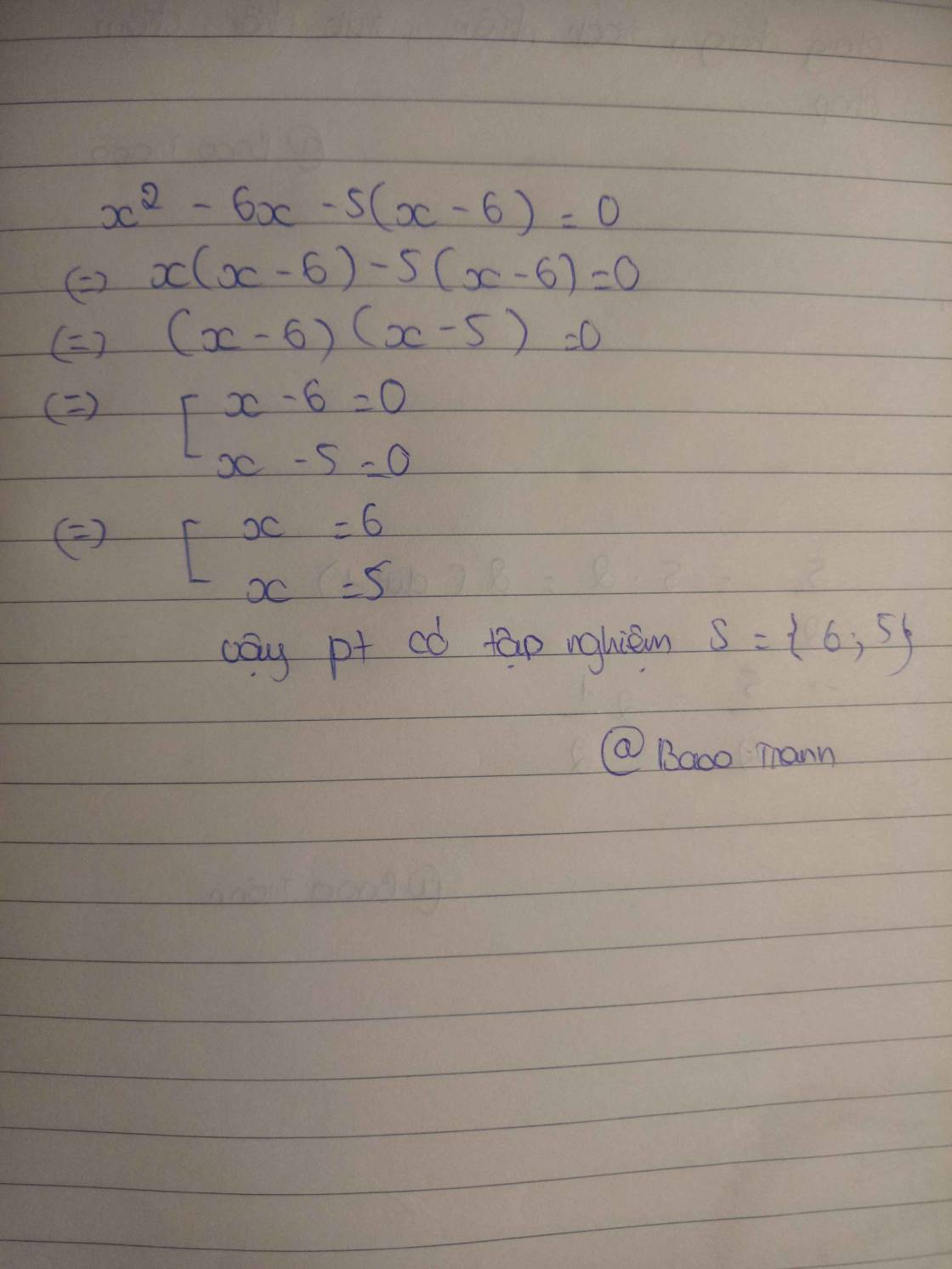giải phương trình x^2 -x -6=0

Những câu hỏi liên quan
Câu 1:Tìm nghiệm của bất phương trình x²-5x-6-6|x+1|≤0
Câu 2: Giải bất phương trình|x²-3|+2x≥0
Xem chi tiết
(x+2)/(x-6) - (x+6)/(x-2) + (x^2+x-38)/(x^2-8+12) = 0. Giải phương trình?
Giải phương trình
(6\(x\)-3)(5+\(x^2\))=0
vì \(5+x^2\ge5\left(\forall x\in R\right)\)
=>6x-3=0
=>x=\(\dfrac{1}{2}\)
KL:S=\(\dfrac{1}{2}\)
Đúng 0
Bình luận (0)
giải phương trình
x mũ 2 - 6x - 5(x-6) = 0
=>x(x-6)-5(x-6)=0
=>(x-6)(x-5)=0
=>x=5 hoặc x=6
Đúng 0
Bình luận (0)
Giải phương trình và bất phương trình
a) \(3\sqrt{-x^2+x+6}+2\left(2x-1\right)>0\)
b)\(\sqrt{2x^2+8x+5}+\sqrt{2x^2-4x+5}=6\sqrt{x}\)
a.
\(3\sqrt{-x^2+x+6}\ge2\left(1-2x\right)\)
\(\Leftrightarrow\left[{}\begin{matrix}\left\{{}\begin{matrix}-x^2+x+6\ge0\\1-2x< 0\end{matrix}\right.\\\left\{{}\begin{matrix}1-2x\ge0\\9\left(-x^2+x+6\right)\ge4\left(1-2x\right)^2\end{matrix}\right.\end{matrix}\right.\)
\(\Leftrightarrow\left[{}\begin{matrix}\left\{{}\begin{matrix}-2\le x\le3\\x>\dfrac{1}{2}\end{matrix}\right.\\\left\{{}\begin{matrix}x\le\dfrac{1}{2}\\25\left(x^2-x-2\right)\le0\end{matrix}\right.\end{matrix}\right.\)
\(\Leftrightarrow\left[{}\begin{matrix}\dfrac{1}{2}< x\le3\\\left\{{}\begin{matrix}x\le\dfrac{1}{2}\\-1\le x\le2\end{matrix}\right.\end{matrix}\right.\)
\(\Rightarrow-1\le x\le3\)
Đúng 0
Bình luận (0)
b.
ĐKXĐ: \(x\ge0\)
\(\Leftrightarrow\sqrt{2x^2+8x+5}-4\sqrt{x}+\sqrt{2x^2-4x+5}-2\sqrt{x}=0\)
\(\Leftrightarrow\dfrac{2x^2+8x+5-16x}{\sqrt{2x^2+8x+5}+4\sqrt{x}}+\dfrac{2x^2-4x+5-4x}{\sqrt{2x^2-4x+5}+2\sqrt{x}}=0\)
\(\Leftrightarrow\dfrac{2x^2-8x+5}{\sqrt{2x^2+8x+5}+4\sqrt{x}}+\dfrac{2x^2-8x+5}{\sqrt{2x^2-4x+5}+2\sqrt{x}}=0\)
\(\Leftrightarrow\left(2x^2-8x+5\right)\left(\dfrac{1}{\sqrt{2x^2+8x+5}+4\sqrt{x}}+\dfrac{1}{\sqrt{2x^2-4x+5}+2\sqrt{x}}\right)=0\)
\(\Leftrightarrow2x^2-8x+5=0\)
\(\Leftrightarrow x=\dfrac{4\pm\sqrt{6}}{2}\)
Đúng 0
Bình luận (0)
Câu b còn 1 cách giải nữa:
Với \(x=0\) không phải nghiệm
Với \(x>0\) , chia 2 vế cho \(\sqrt{x}\) ta được:
\(\sqrt{2x+8+\dfrac{5}{x}}+\sqrt{2x-4+\dfrac{5}{x}}=6\)
Đặt \(\sqrt{2x-4+\dfrac{5}{x}}=t>0\Leftrightarrow2x+8+\dfrac{5}{x}=t^2+12\)
Phương trình trở thành:
\(\sqrt{t^2+12}+t=6\)
\(\Leftrightarrow\sqrt{t^2+12}=6-t\)
\(\Leftrightarrow\left\{{}\begin{matrix}6-t\ge0\\t^2+12=\left(6-t\right)^2\end{matrix}\right.\)
\(\Leftrightarrow\left\{{}\begin{matrix}t\le6\\12t=24\end{matrix}\right.\)
\(\Rightarrow t=2\)
\(\Rightarrow\sqrt{2x-4+\dfrac{5}{x}}=2\)
\(\Leftrightarrow2x-4+\dfrac{5}{x}=4\)
\(\Rightarrow2x^2-8x+5=0\)
\(\Leftrightarrow...\)
Đúng 0
Bình luận (0)
Giải phương trình
\(\sin x+2\cos x+2\tan x+4\cot x+6=0\)
a) Cho phương trình $x^{2}-m x-10 m+2=0$ có một nghiệm $x_{1}=-4$. Tìm $m$ và nghiệm còn lại.
b) Cho phương trình $x^{2}-6 x+7=0 .$ Không giải phương trình, hãy tính tổng và tích của hai nghiệm của phương trình đó.
a, Do \(x=-4\)là một nghiệm của pt trên nên
Thay \(x=-4\)vào pt trên pt có dạng :
\(16+4m-10m+2=0\Leftrightarrow-6m=-18\Leftrightarrow m=3\)
Thay m = 3 vào pt, pt có dạng : \(x^2-3x-28=0\)
\(\Delta=9-4.\left(-28\right)=9+112=121>0\)
vậy pt có 2 nghiệm pb : \(x_1=\frac{3-11}{2}=-\frac{8}{2}=-4;x_2=\frac{3+11}{2}=7\)
b, Theo Vi et : \(\hept{\begin{cases}x_1+x_2=-\frac{b}{a}=6\\x_1x_2=\frac{c}{a}=7\end{cases}}\)
Vậy m=3, và ngiệm còn lại x2=7
a)
m = 3
x2=7
Xem thêm câu trả lời
giải phương trình: 2(x-4)\(\sqrt{x-2}\)+(x-2)\(\sqrt{x+1}\)+2x-6=0
ĐKXĐ: $x \geq 2$
\(\Leftrightarrow2\left(x-4\right).\sqrt{x-2}-2\left(x-4\right)+\left(x-2\right)\sqrt{x+1}-2\left(x-2\right)+6x-18=0\\ \Leftrightarrow2.\left(x-4\right).\dfrac{x-3}{\sqrt{x-2}+1}+\left(x-2\right).\dfrac{x-3}{\sqrt{x+1}+2}+6.\left(x-3\right)=0\\ \Leftrightarrow\left(x-3\right)\left(\dfrac{2.\left(x-4\right)}{\sqrt{x-2}+1}+\dfrac{x-2}{\sqrt{x+1}+2}+6=0\right)\\ \Leftrightarrow x=3\)
Vì \(\dfrac{2.\left(x-4\right)}{\sqrt{x-2}+1}+\dfrac{x-2}{\sqrt{x+1}+2}+6=\dfrac{2\left(x-4\right)+4.\sqrt{x-2}+4}{\sqrt{x-2}+1}+\dfrac{x-2}{\sqrt{x+1}+2}+2\\ =\dfrac{2\left(x-2\right)+4.\sqrt{x-2}}{\sqrt{x-2}+1}+\dfrac{x-2}{\sqrt{x+1}+2}+2>0\)
Vậy....
Đúng 1
Bình luận (0)
Cho phương trình: x2 – (m – 2)x – m + 5 = 0 (ẩn x).
1) Giải phương trình khi m = 6.
2) Tìm m để phương trình có hai nghiệm phân biệt.
1, Thay m=6 vào pt ta có:
\(x^2-\left(6-2\right)x-6+5=0\\ \Leftrightarrow x^2-4x-1=0\)
\(\Delta=\left(-4\right)^2-4.1.\left(-1\right)=16+4=20\)
\(x_1=\dfrac{4+2\sqrt{5}}{2}=2+\sqrt{5},x_2=\dfrac{4-2\sqrt{5}}{2}=2-\sqrt{5}\)
\(2,\Delta=\left[-\left(m-2\right)\right]^2-4\left(-m+5\right)\\ =m^2-4m+4+4m-20\\ =m^2-16\)
Để pt có 2 nghiệm phân biệt thì
\(\Delta>0\\ \Leftrightarrow m^2-16>0\\ \Leftrightarrow\left[{}\begin{matrix}m>4\\m< -4\end{matrix}\right.\)
Đúng 0
Bình luận (0)
Giải các bất phương trình sau:
a) \( - 5{x^2} + x - 1 \le 0\)
b) \({x^2} - 8x + 16 \le 0\)
c) \({x^2} - x + 6 > 0\)
a) Tam thức \(f(x) = - 5{x^2} + x - 1\) có \(\Delta = - 19 < 0\), hệ số \(a = - 5 < 0\) nên f(x) luôn âm (cùng dấu với a) với mọi x, tức là \(\)\( - 5{x^2} + x - 1 < 0\) với mọi \(x \in \mathbb{R}\). Suy ra bất phương trình có vô số nghiệm
b) Tam thức \(g(x) = {x^2} - 8x + 16\) có \(\Delta = 0\), hệ số a=1>0 nên g(x) luôn dương (cùng dấu với a) với mọi \(x \ne 4\), tức là \({x^2} - 8x + 16 > 0\) với mọi \(x \ne 4\)
Suy ra bất phương trình có nghiệm duy nhất là x = 4
c) Tam thức \(h(x) = {x^2} - x + 6\) có \(\Delta = - 23 < 0\), hệ số a=1>0 nên h(x) luôn dương (cùng dấu với a) với mọi x, tức là \({x^2} - x + 6 > 0\) với mọi \(x \in \mathbb{R}\). Suy ra bất phương trình có vô số nghiệm.
Đúng 0
Bình luận (0)




























